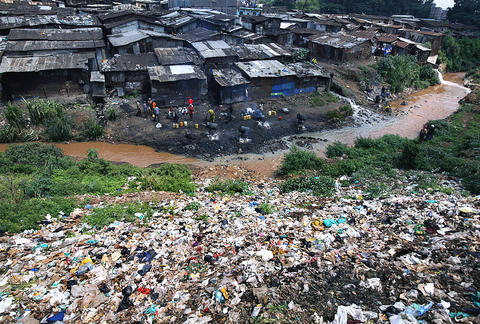These days Charity Bokindo, the district commissioner of Nairobi North, is taking no chances. Wherever she goes, she carries not one but two pistols, and she always travels with armed guards.
"The Mungiki," she whispered, "they threatened to circumcise me."
Kihara Mwangi, a member of Kenya's parliament, recently disclosed that he had been kidnapped by the Mungiki, a secret society that is part Sicilian Mafia, part Chicago street gang, with a little of the occult sprinkled in.

PHOTO: NY TIMES NEWS SERVICE
"These guys are devil worshipers," he said. "And no one knows what they want."
The Mungiki mystery is sweeping across Kenya, taking a lot of lives with it. In a month, more than 50 people have been killed in a crime spree and brutal police crackdown.
Police officials say the Mungiki aim to destabilize the country before the presidential elections in December and blame them for some downright ugly acts: chopping off legs, skinning heads and guzzling jugs of human blood. Government officials accuse them of running an extortion empire and hacking up victims.
The Mungiki Menace, as local papers call it, plays into many of Kenya's sore spots: tribal frictions, political shenanigans, poverty and crime. The flash point is Mathare, a giant slum and mountain of rust near Nairobi, the capital, where 500,000 people fill a warren of corrugated metal shanties.
On a recent afternoon, John Kinywa, 17, a passion fruit juice vendor, trolled his patch of Mathare, shaking a plastic bowl for donations for a friend's funeral.
"Just a shilling; can't you spare a shilling?" he asked passers-by, who, by the look of their ragged clothes and chopstick legs, probably could not.
Kinywa said police officers shot his friend, who he insisted was innocent, in a raid against the Mungiki early this month.
Mathare is one of countless slums in Kenya that the government does not quite reach. There are no police stations here, or fire hydrants or roads.
The Mungiki did not start here. They came from the Kikuyu tribal highlands north of Nairobi, that carpeted green, straight-off-a-postcard Out of Africa side of Kenya.
According to Hezekiah Ndura Waruinge, one of the Mungiki's founders, the group began as a local defense squad during land clashes in the late 1980s between forces loyal to the government, which was dominated by the Kalenjin tribe, and farmers who were Kikuyu, a rival tribe.
By the late 1990s, the Mungiki went urban, Waruinge explained, taking over the city's minibus trade.
Then they diversified into garbage collection, building materials and the protection racket.
But then the Mungiki made a mistake, Waruinge said, and dabbled in politics, supporting losing candidates in the elections of 2002 and falling on the wrong side of the government.

POLITICAL PRISONERS VS DEPORTEES: Venezuela’s prosecutor’s office slammed the call by El Salvador’s leader, accusing him of crimes against humanity Salvadoran President Nayib Bukele on Sunday proposed carrying out a prisoner swap with Venezuela, suggesting he would exchange Venezuelan deportees from the US his government has kept imprisoned for what he called “political prisoners” in Venezuela. In a post on X, directed at Venezuelan President Nicolas Maduro, Bukele listed off a number of family members of high-level opposition figures in Venezuela, journalists and activists detained during the South American government’s electoral crackdown last year. “The only reason they are imprisoned is for having opposed you and your electoral fraud,” he wrote to Maduro. “However, I want to propose a humanitarian agreement that

Young women standing idly around a park in Tokyo’s west suggest that a giant statue of Godzilla is not the only attraction for a record number of foreign tourists. Their faces lit by the cold glow of their phones, the women lining Okubo Park are evidence that sex tourism has developed as a dark flipside to the bustling Kabukicho nightlife district. Increasing numbers of foreign men are flocking to the area after seeing videos on social media. One of the women said that the area near Kabukicho, where Godzilla rumbles and belches smoke atop a cinema, has become a “real

‘POINT OF NO RETURN’: The Caribbean nation needs increased international funding and support for a multinational force to help police tackle expanding gang violence The top UN official in Haiti on Monday sounded an alarm to the UN Security Council that escalating gang violence is liable to lead the Caribbean nation to “a point of no return.” Special Representative of the UN Secretary-General for Haiti Maria Isabel Salvador said that “Haiti could face total chaos” without increased funding and support for the operation of the Kenya-led multinational force helping Haiti’s police to tackle the gangs’ expanding violence into areas beyond the capital, Port-Au-Prince. Most recently, gangs seized the city of Mirebalais in central Haiti, and during the attack more than 500 prisoners were freed, she said.

DEMONSTRATIONS: A protester said although she would normally sit back and wait for the next election, she cannot do it this time, adding that ‘we’ve lost too much already’ Thousands of protesters rallied on Saturday in New York, Washington and other cities across the US for a second major round of demonstrations against US President Donald Trump and his hard-line policies. In New York, people gathered outside the city’s main library carrying signs targeting the US president with slogans such as: “No Kings in America” and “Resist Tyranny.” Many took aim at Trump’s deportations of undocumented migrants, chanting: “No ICE [Immigration and Customs Enforcement], no fear, immigrants are welcome here.” In Washington, protesters voiced concern that Trump was threatening long-respected constitutional norms, including the right to due process. The